173
Why do you want to dream of a second child?
You raise children, you raise them the same way, and you grow up to be completely different people. Of course, the innate qualities of the child play a significant role, but that is not all. It also affects how the child was born in the family. Whether the eldest child is the youngest or the only one depends on his character, manner of behavior and success in the future.

It doesn’t seem to work that way, but scientists are proving otherwise. Editorial "Site" I decided to look into this issue and find out all the nuances.
Scientists from the University of California conducted a study in which they studied the effect of family size on the achievement of children in the future. At first, their study found that the larger the family size, the less likely children are to become successful.
The sample was quite large and a negative correlation between family size and children's accomplishments was indeed evident. However, the scientists decided not to dwell on this, they introduced into their studies one variable – the order of birth of children in the family.

The results were unexpected. It turned out that family size is not the main factor. The study took into account many variables that had different effects. However, the influence of birth order has always remained stable.
Scientists went further and decided to find out exactly how the child is affected by what he was born. It turned out that the second child is more harmful and capricious than the first child. Accordingly, younger children are less likely to be successful than their older siblings.

This has nothing to do with the family’s financial situation or health. It turns out it's because of the parents and the older child. With the second child, parents do not behave as strictly as with the firstborn, and the oldest becomes the main example for the youngest.
From the order of appearance in the family depends on the identity of the child. Scientists have even identified a set of distinctive characteristics that are inherent in different children: the firstborn or only child, middle and youngest. Let’s figure out what these traits are and how parents work with them.

It's amazing how interconnected everything is. It turns out that the number of children in families and the order of their appearance plays a very important role. Of course, this does not mean that everything will be like this anyway, there are too many variables in life. It is much more important to work with this information and guide children, reducing the influence of certain factors. Parenting is not easy. Good luck and patience.
Earlier we told why you can not burden the older child with the care of the younger.
We also wrote about why some children are capricious and harmful, while others do not.
We also talked about what motivates a woman to create a large family and how a mother with many children copes.

It doesn’t seem to work that way, but scientists are proving otherwise. Editorial "Site" I decided to look into this issue and find out all the nuances.
Scientists from the University of California conducted a study in which they studied the effect of family size on the achievement of children in the future. At first, their study found that the larger the family size, the less likely children are to become successful.
The sample was quite large and a negative correlation between family size and children's accomplishments was indeed evident. However, the scientists decided not to dwell on this, they introduced into their studies one variable – the order of birth of children in the family.

The results were unexpected. It turned out that family size is not the main factor. The study took into account many variables that had different effects. However, the influence of birth order has always remained stable.
Scientists went further and decided to find out exactly how the child is affected by what he was born. It turned out that the second child is more harmful and capricious than the first child. Accordingly, younger children are less likely to be successful than their older siblings.

This has nothing to do with the family’s financial situation or health. It turns out it's because of the parents and the older child. With the second child, parents do not behave as strictly as with the firstborn, and the oldest becomes the main example for the youngest.
From the order of appearance in the family depends on the identity of the child. Scientists have even identified a set of distinctive characteristics that are inherent in different children: the firstborn or only child, middle and youngest. Let’s figure out what these traits are and how parents work with them.

- Firstborn
Studies show that older children in a family grow up persistent and purposeful. Firstborns are often distinguished by perfectionism, trying to do everything right and well. They are more responsible and organized. They often make good leaders. The same is true for the only child in the family. Only they have leadership qualities complemented by unprecedented independence. Such children develop faster, they are more comfortable to communicate with older than with peers.
Statistics show that it is the firstborn who most often achieve greater success in the future. Of course, these laws have reservations. It does not mean that being born second, the child automatically loses the chance of success. This largely depends on the parents.
Usually, older children choose professions that value structure and order: science, medicine, law. However, there is another side of the coin, older children often suffer from anxiety and fear of not meeting their parents’ expectations. It is difficult for them to be carefree and enjoy life.
The task of parents in this case is to teach the child to enjoy the world around him, appreciate the rest and not be afraid to make mistakes. Don’t ask your child to do everything perfectly, let them make mistakes and learn from their mistakes. In addition, parents should not shift to older care for younger children. It's bad for everyone.
- Middle-aged children
When a child has older and younger siblings, he or she grows very communicative and diplomatic. He has more problems than the firstborn. They have an innate craving for tricks and pranks. These children are hard to upset, but they can rebel and protest. In adulthood, middle-aged children try to quickly leave the parental home and start an independent life. They may feel out of business at home. That’s because they’re in the middle, between senior and junior. They don't feel unique.
352268
Parents with middle-aged children need to be even more careful. You can’t compare them with anyone, on the contrary, more often focus on what they are good at. In the future, it will help you become more confident. Teach the child to defend his point of view and not to go along with others.
However, this description is not always in point. If, for example, a girl is born first and a boy is born second, he will show the features of the firstborn. It's the same with the girl. It is also important to consider this factor.
- Little boy.
These are cute and charming kids who like to be the center of attention. They are very sociable, easily converge with other people, and also know how to turn everything to their benefit. It’s always someone else’s fault, like an older child. Seeing the example of an older child, they subconsciously compare themselves to him. However, due to age, older children know more, which means younger children think they are losing the competition. Because of this, they always try to attract attention by any means.
If they fail to compete with older children with achievements, they compensate for it with harm. They make parents and teachers pay more attention to them. That is why younger parents are more concerned.
However, there is an exception: if children have a large age difference (more than 5 years), the younger will show the features of the firstborn. Such children perfectly combine leadership qualities and cheerful character.
It is important for parents to teach their youngest child independence. After all, due to the fact that there is someone older nearby, such children can grow up infantile. Help the child to find inner strength and independence.
It's amazing how interconnected everything is. It turns out that the number of children in families and the order of their appearance plays a very important role. Of course, this does not mean that everything will be like this anyway, there are too many variables in life. It is much more important to work with this information and guide children, reducing the influence of certain factors. Parenting is not easy. Good luck and patience.
Earlier we told why you can not burden the older child with the care of the younger.
We also wrote about why some children are capricious and harmful, while others do not.
We also talked about what motivates a woman to create a large family and how a mother with many children copes.





























